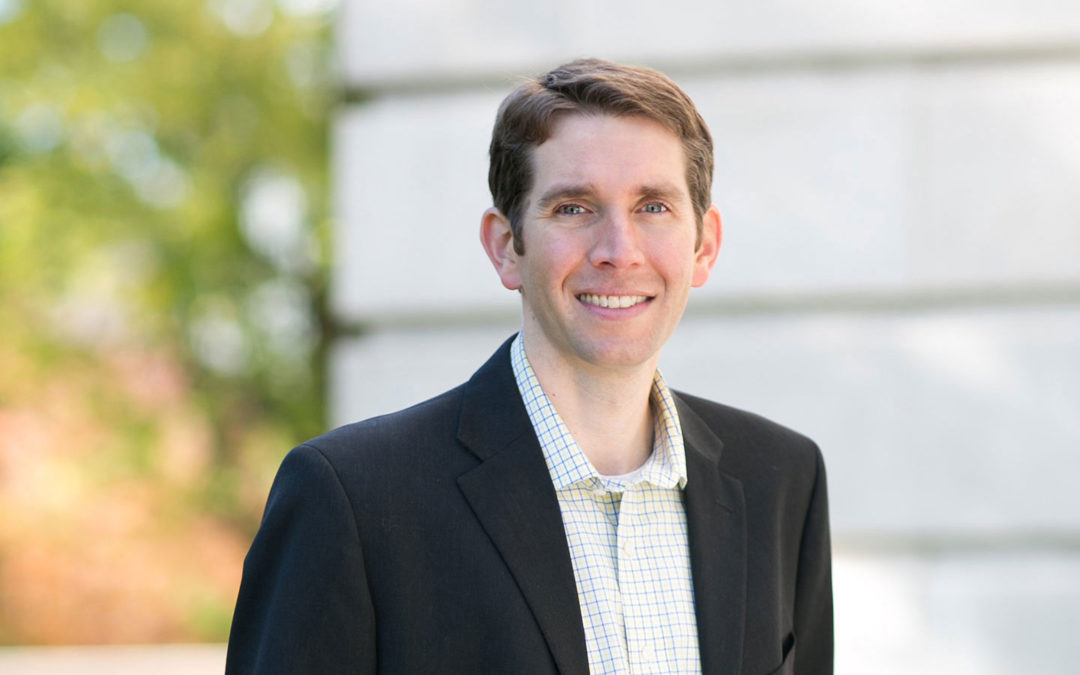
by Tyler Huebner | Mar 16, 2020 | Public Service Commission, RENEW Wisconsin
Dear RENEW Wisconsin Members and Supporters,
First and foremost, I wish you, your families, and everyone well during this unprecedented time regarding the novel coronavirus and COVID-19. I urge you to continue following the ever-changing guidelines coming from the Center for Disease Control and your elected officials at all levels to help keep each other safe.
With that said, last week Governor Tony Evers appointed me to be the next Commissioner at the Public Service Commission of Wisconsin.
With this change, I will be leaving RENEW Wisconsin, and my last day is today. I started with RENEW in June of 2013, and I want to thank you all for your support of the organization, and of me, since then.
It has been extremely rewarding to be the Executive Director of this organization, and I feel very proud of the organization’s growth and successes during my period here.
Heather Allen will be the organization’s Interim Executive Director starting immediately. Heather has been with the organization for nearly two years, and she will do an excellent job advancing its mission and priorities going forward. You can reach her at heather@renewwisconsin.org or 608-255-4044 extension 1.
In addition to Heather, the rest of the RENEW staff is here to support you however they can.
Thank you, again, for the opportunity to serve this organization and all of you in this role. It has been a distinct pleasure!
Sincerely,
Tyler Huebner
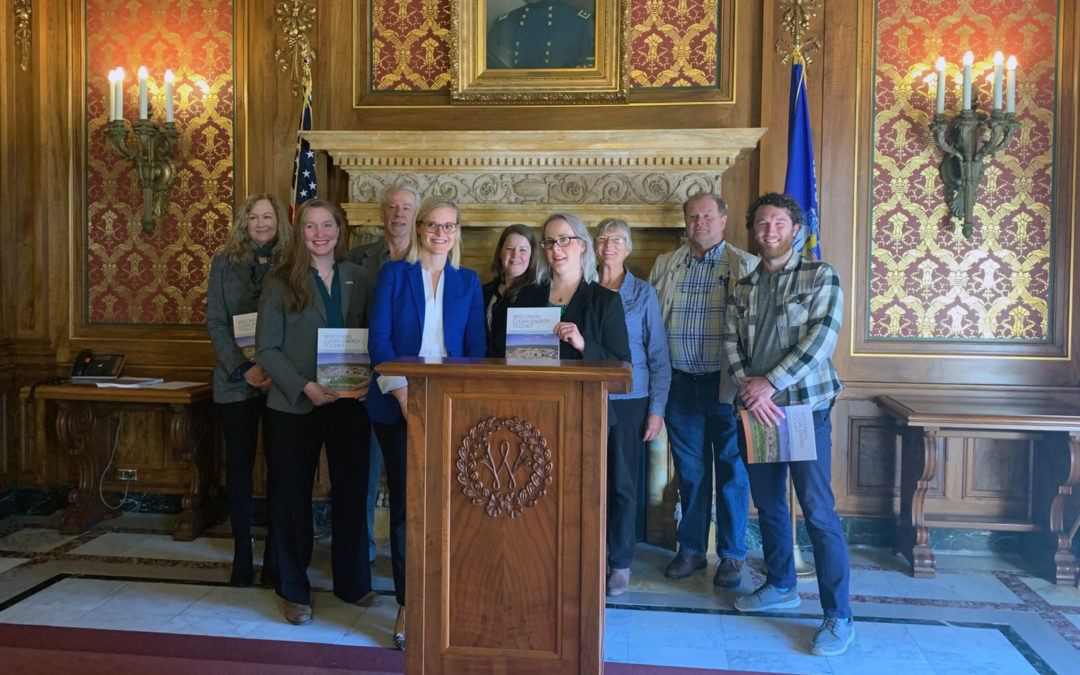
by Heather Allen | Mar 10, 2020 | Advocacy, Community, Local Government, Local Initiatives, Policy, Programs, Public Service Commission, RENEW Wisconsin, Renewables
RENEW Wisconsin, Wisconsin Conservation Voters, and Sierra Club have released the Wisconsin Clean Energy Toolkit: Developing a Clean Energy Plan for Your Community.
Towns, villages, cities, and counties in Wisconsin are building the renewable energy economy. The Wisconsin Clean Energy Toolkit recognizes this leadership in Wisconsin communities and the opportunities to expand these efforts across the state.
As part of its statewide launch, clean energy leaders, including Wisconsin State Treasurer Sarah Godlewski, addressed members of the media and the public across the state on March 10th, 2020 to announce the release.
“The Wisconsin Clean Energy Toolkit will help communities develop clean energy plans, which are good for the environment and also can be good for a community’s bottom line,” said State Treasurer Sarah Godlewski. “I’ve seen this firsthand as the Chair of a $1.2 billion trust fund, how we’ve helped local governments finance projects such as solar panels that saved taxpayers’ money. I hope communities across the state see us as a partner in their projects to address climate change and lower energy costs.”
Local communities across Wisconsin are eager to develop and implement clean energy plans. Often, they struggle with how to begin from a technical perspective and how to engage their communities.
“Smaller communities often lack the staff to conduct clean energy assessments and make recommendations,” said Jennifer Giegerich, Government Affairs Director for Wisconsin Conservation Voters. “This toolkit is a comprehensive resource for those considering a commitment to clean energy.”
The Wisconsin Clean Energy Toolkit is a comprehensive guide to energy policy options in Wisconsin. The toolkit is a resource designed to help guide communities of varying sizes and with differing resources as they consider, craft, and implement clean energy policies, and how to ensure the greatest return on potential clean energy investments.
“Local governments have heard from their residents; they want to shift to clean, renewable energy,” said Heather Allen, Program Director for RENEW Wisconsin. “But they need resources and technical support to make the transition. This toolkit offers practical strategies to help communities access affordable clean energy.”
“The Public Service Commission’s Office of Energy Innovation is committed to delivering programs that have a measurable impact on our state, this is why we’ve supported the Energy Independent Communities and will continue to support (with grants and technical assistance like this guide) communities and Tribal Nations on the road to our clean energy future,” Megan Levy, Local Energy Programs Manager & Energy Assurance Coordinator, Office of Energy Innovation, Public Service Commission of Wisconsin.
The Clean Energy Toolkit provides information to help local communities including:
- How to understand current state policies and regulations that impact energy use in Wisconsin
- Guidance on how to commit to clean energy
- How to build support in the community for clean energy policies
- How to establish a baseline of current energy use in the community, and how to set benchmarks to track progress toward long-range goals
- Defines equitable carbon reduction strategies that protect vulnerable communities when making the transition to clean energy, and how to ensure all impacted constituencies have a voice at the decision-making table
- Provides an overview of various financing options available to local governments to pursue clean energy
“As Wisconsinites demand action on climate change, local communities are answering those calls,” said Elizabeth Ward, Director for Sierra Club Wisconsin. “We’re glad to provide a resource for those communities as they demonstrate the leadership we’re missing at the federal level.”
The toolkit is available to download at www.wicleanenergytoolkit.com. For additional information, questions, or to request a paper copy of the toolkit, please contact Heather Allen (heather@renewwisconsin.org)
Visit www.wicleanenergytoolkit.com to learn more.
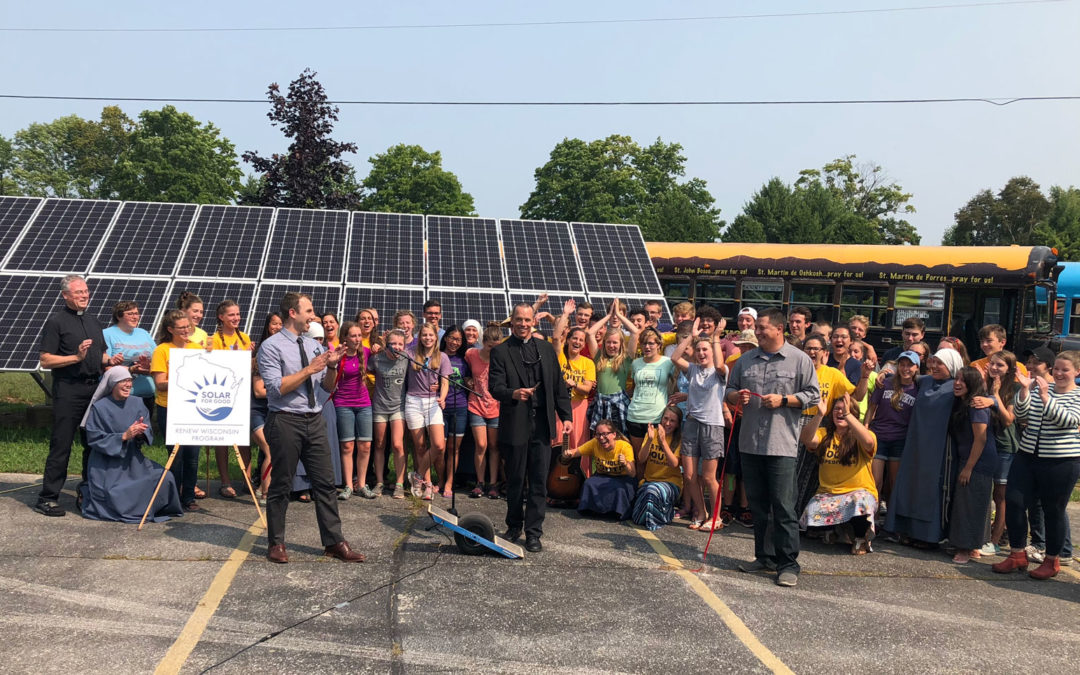
by Sam Dunaiski | Mar 2, 2020 | Local Initiatives, RENEW Wisconsin, Solar, Solar for Good
RENEW Wisconsin’s Solar for Good program has opened its sixth round of donations to help Wisconsin nonprofits install solar power. Grant applications are due Wednesday, May 1, 2020 at www.renewwisconsin.org/solarforgood.
Since 2017, the Solar for Good program has partnered with 75 Wisconsin nonprofit organizations to go solar. When completed, these organizations will have installed 91 solar arrays for a total of 3.24 megawatts of solar electricity, enough to power nearly 700 households.
Solar for Good is administered by RENEW Wisconsin, a statewide renewable energy nonprofit organization. Through a generous donation from the Couillard Solar Foundation, Solar for Good supplies winning nonprofits with solar panels to reduce the overall cost of installing solar power.
This is Solar for Good’s sixth award cycle, and the program has assisted nonprofits of all types and sizes across Wisconsin. The grantees include 25 houses of worship, 4 environmental conservation groups, 5 animal shelters, 17 schools and education centers, 2 veterans’ groups, and 20 housing providers.
To date, 45 organizations have completed installation of 51 solar arrays. Around $488,000 worth of grants have been dispersed from the Couillard Solar Foundation, and these grants have spurred over $4 million in solar investment across Wisconsin.
By accepting a Solar for Good award, nonprofits agree to promote the environmental and economic benefits of solar power to their communities. Winning organizations educate their members about solar power and are able to showcase their projects’ benefits.
Grant applications for Solar for Good must be received by Wednesday, May 1st 2020. Decisions and award announcements will be made on or before Wednesday, May 15th, 2020. RENEW Wisconsin plans on holding an additional round of Solar for Good funding in September of 2020.
How to apply for a solar grant
Organizations can learn more and apply at www.renewwisconsin.org/solarforgood. In order to be eligible, the organization must be a registered nonprofit organization located in Wisconsin, be in good financial standing, be ready to install solar, and agree to participate in educating community members about the benefits of solar energy. If approved for a solar panel award, all fundraising, design and installation for the solar project must be completed within 12 months.
Applications for the Spring 2020 Solar for Good cycle must be received by Wednesday, May 1st 2020. Decisions and award announcements will be made on or before Wednesday, May 15th, 2020.
For organizations looking at solar power for the first time, technical assistance grants are available to fund a solar site assessment (up to $250) or engineering review (up to $500) for their solar array. These applications will be reviewed separately from the applications for solar panel awards and will be allocated on a first-come, first-served basis.
About Solar for Good
RENEW Wisconsin’s Solar for Good initiative fosters the expansion of solar power among mission-based nonprofits in Wisconsin. Through a generous partnership with Couillard Solar Foundation, RENEW Wisconsin awards solar panels to nonprofit organizations, helping them switch to clean, renewable, solar energy. More information can be found at www.renewwisconsin.org/solarforgood/.
About RENEW Wisconsin
RENEW Wisconsin is a nonprofit organization which promotes renewable energy in Wisconsin. We work on policies and programs that support solar power, wind power, biogas, local hydropower, geothermal energy, and electric vehicles. More information on RENEW’s website: www.renewwisconsin.org.
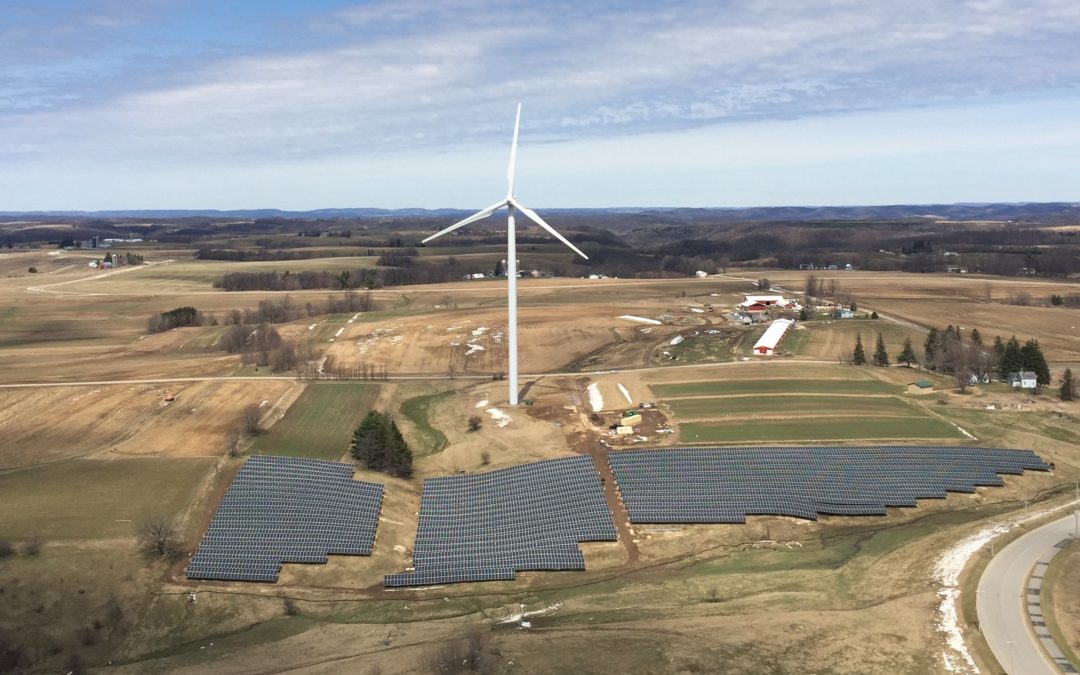
by Michael Vickerman | Jan 13, 2020 | Community, Events, RENEW Wisconsin, Renewables, Solar
At its ninth annual Renewable Energy Summit, set for Thursday January 16, 2020, RENEW Wisconsin will recognize individuals and organizations who have made significant and lasting advances in renewable energy development here in Wisconsin.
Titled “2020 Vision: The Path to 100% Clean Energy,” RENEW Wisconsin’s Summit will take place at Monona Terrace in Madison. Registration starts at 7:00 AM, with entry-level sessions on renewable energy and the electric grid at 7:30am. The main program runs from 8:30 AM to 3:30 PM. The recognition ceremony will begin at 12:45 PM. (Link to Renewable Energy Summit)
At this year’s Summit, RENEW will present five awards to renewable energy champions, developers and businesses for their leadership and accomplishments in 2019. The awards have been grouped under four categories which are listed below. They are:
- RENEWABLE ENERGY PIONEERS OF THE YEAR
- Madison Gas and Electric
- City of Middleton
- Middleton-Cross Plains Area School District
- RENEWABLE ENERGY BUSINESS OF THE YEAR
- Carlson Electric, Hayward
- RENEWABLE ENERGY CATALYSTS OF THE YEAR
- Bjorn Thompson and Jon McCarthy, Attic Angels, Madison
- Sister Rose Jochmann, Sisters of St. Francis of the Holy Cross, Green Bay
- RENEWABLE ENERGY PROJECT OF THE YEAR
- Butter Solar
- OneEnergy Renewables (developer)
- BluEarth Renewables (owner/operator)
- 10 municipal electric utilities (power purchasers)
- Organic Valley (Renewable Energy Credit purchaser)
- City of Madison (Renewable Energy Credit purchaser)
RENEWABLE ENERGY PIONEERS OF THE YEAR
This voluntary initiative, which will result in 1.5 MWAC of new solar power, involves many “firsts.” In 2017, Madison Gas and Electric (MGE) became the first electric utility in Wisconsin to launch a voluntary service that supplies electricity generated from a new solar power plant to retail customers. In 2019, MGE received approval for its first two contracts sleeved through its Renewable Energy Rider service. Ground has now been broken on an array near Middleton’s airport that will supply solar power over a 30-year period to two pioneering MGE customers, Middleton-Cross Plains Area School District and the City of Middleton. When MGE’s array is energized later this year, these utility customers will become the first in Wisconsin to receive solar power under this novel structure.
RENEWABLE ENERGY BUSINESS OF THE YEAR
A family-owned business since 1977, Hayward-based Carlson Electric has emerged as a leading solar energy contractor serving much of northern Wisconsin. In recent years, Carlson Electric has demonstrated considerable skill in financing and designing solar systems for nonprofit groups and civic entities. Indeed, Carlson’s ability to access funds through the Solar for Good program, PACE financing, and Wisconsin Energy Innovation grants was a critical factor in helping such customers as Solon Springs School District, Spooner Ice Arena, Burnett County Humane Society, and Northland Lutheran High School invest in solar power in 2019. Carlson is well on its way to completing the state’s most expansive solar initiative aimed at low- and moderate-income households. By this time next year, Carlson will have financed and installed 269 kilowatts of rooftop solar capacity directly serving 108 apartment dwellers in Sawyer County.
RENEWABLE ENERGY CATALYSTS OF THE YEAR
(1) In 2014, the Sisters of St. Francis of the Holy Cross, located in Green Bay, commissioned the installation of a 112-kW ground-mounted solar array to power the premises and serve as an outdoor classroom on clean energy. Working with the same local contractor (Eland Electric), the Sisters of St. Francis added a 98 kW array next to the existing one in 2019. The result is an inspiring and artfully arranged landscape that combines the ethic of planetary stewardship with the beauty of solar power. The leadership and guidance provided by Sister Rose Jochmann, chair of the community’s sustainability committee, was critical to the ultimate success of this initiative. In her own words: “In 2014, we had hoped to generate half of our electricity from solar but could afford only one-third. Our commitment to sustainability and care of the earth compelled us to look at our options again in 2018.”
(2) Located in Madison’s west side, Attic Angel Community is a senior living campus whose residents include many talented and dedicated volunteers. Last year, Attic Angels contracted with Pewaukee-based SunVest Solar to install PV panels on two apartment wings, totaling 98 kW. That first taste of solar power opened the door to a larger effort initiated by two volunteers living in the Attic Angels Prairie Point community, Bjorn Thompson and Jon McCarthy. Thompson and McCarthy have served on the community’s sustainability committee. Working with SunVest, they designed an offering—effectively a solar group buy—which they presented to their Prairie Point neighbors in hopes that they would take part. Of the 123 households living in Prairie Point, 40 signed up to host solar panels on their roofs, resulting in a total of 133 kW. With that initiative, combined with a 135 kW array installed in 2019 on the roof of Attic Angels’ memory care unit, the campus now hosts 366 kW of rooftop solar capacity, the largest serving a senior housing community in Wisconsin.
RENEWABLE ENERGY PROJECT OF THE YEAR
Butter Solar consists of 10 PV arrays in three states totaling 22.9 MWAC, including seven scattered across western Wisconsin with a total capacity of 17 MWAC. Taken together, the seven arrays constituted the largest addition to Wisconsin’ electric generating fleet in 2019.
From a contractual perspective, Butter Solar may be the most creative solar project in the country. Owned and operated by BluEarth Renewables, Butter Solar’s Wisconsin portfolio supplies low-cost power to the municipal utilities serving Arcadia, Argyle, Cashton, Cumberland, Elroy, Fennimore, and New Lisbon. The villages of La Farge, Viola, and Merrillan are also Butter Solar participants. The same project also generates Renewable Energy Credits for Organic Valley and the City of Madison, helping them meet their ambitious renewable energy goals.
Seattle-based developer OneEnergy Renewables, through their local Madison office, created the complex financing structure that allowed these entities to pool their resources into the project and receive value from it in return. OneEnergy also designed the arrays to blend in with the rural landscape while promoting wildlife and pollinator species. Wisconsin contractors such as Arch Electric contributed by providing expertise and high-quality workmanship.
This year’s summit program will also draw attention to other milestones and notable achievements in 2019, including the following:
- The Public Service Commission approved three large projects that will add 550 MW of solar power in the state by 2021, effectively quadrupling current levels.
- Grant County approved a 21- to 24-turbine wind project proposed by Minnesota-based Project Resources Corporation. Red Barn is the first project to be granted a permit by a local government under Wisconsin’s wind siting rule (PSC 128).
- At its Yahara landfill, Dane County completed the first project in the nation capable of receiving biogas from multiple off-site locations and injecting the cleaned-up methane into a pipeline network that serves CNG gas stations locally and across the nation.
- RENEW and Wisconsin Clean Cities team up to co-host “The Future of Transportation Day” at the State Capitol. The event engages visitors to see how vehicle technology is shaping the transportation landscape, and provided opportunities for test-driving the electric, hybrid and alternative fuel vehicles displayed outside.
- OneEnergy and Arch Electric designed and built a 1 MW array in Ashland, the third shared solar project for Xcel Energy’s Renewable*Connect program.
- Seven residential group solar purchase programs across Wisconsin accounted for 310 installations totaling 1,983 kW of new solar capacity. Both numbers represent all-time highs.
- Central Storage & Warehouse and SunPeak teamed up to install a 654 kW rooftop PV system on a third CS&W property, this one in Caledonia. With more than 2 MW powering its operations, CS&W is the second largest solar host in Wisconsin.
- Adding 230 kW of PV generation atop its parking canopies, Appleton International Airport (ATW) now has more than 500 kW of solar powering its operations, the most at any Wisconsin airport.
- RENEW’s Solar for Good program provides grants that, in 2019, leveraged the installation of more than one megawatt of solar capacity serving 27 nonprofit-owned sites across the state.
Click here for more information on the 2020 Summit program agenda, speakers, and registration.
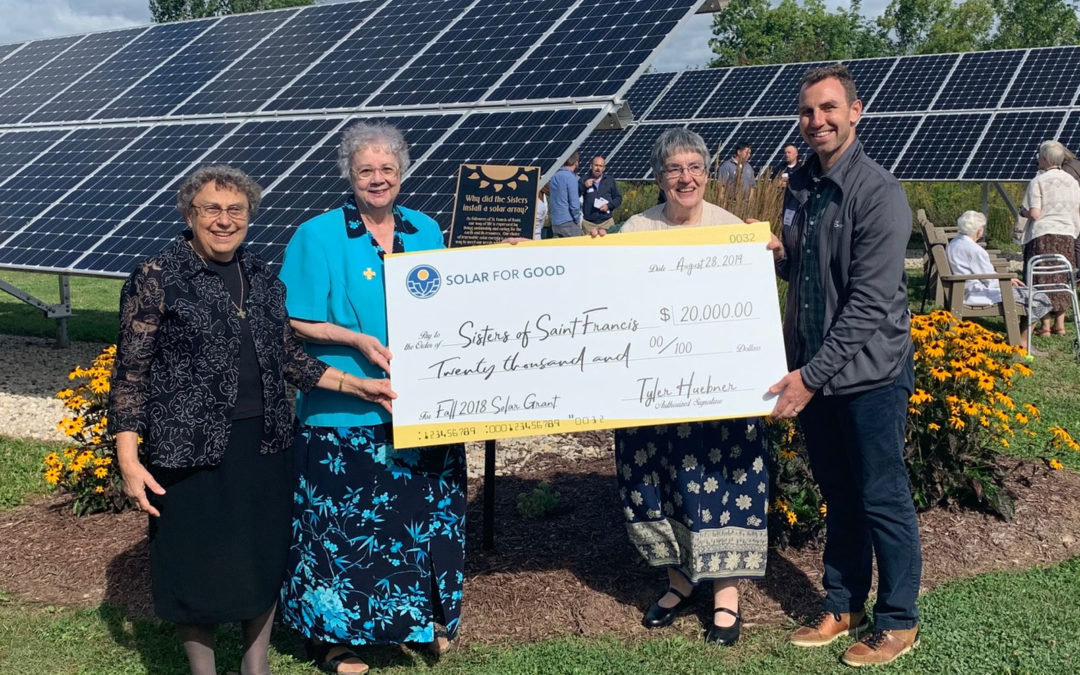
by Sam Dunaiski | Dec 16, 2019 | Community, Local Initiatives, Programs, RENEW Wisconsin, Solar, Solar for Good
RENEW Wisconsin’s Solar for Good program will issue nearly $140,000 worth of solar panels to Wisconsin nonprofits as part of their fall 2019 funding cycle. These grants will go to 13 organizations across the state that together will install nearly 600 kilowatts of clean, renewable electricity. When completed, these solar projects will lead to over $1.2 million of solar investment in Wisconsin.
The following organizations have been offered Solar for Good grants to install new solar electric systems:
CAP Services, poverty alleviation, Stevens Point
Camp Amnicon, outdoor retreat and spiritual worship, South Range
Menīkānaehkem, Native American educational organization, Gresham
Habitat for Humanity – La Crosse Area, affordable housing provider, La Crosse
Jackson County Animal Shelter, safe haven for stray animals, Black River Falls
Heartland Housing, affordable housing provider, Madison
First Unitarian Society of Milwaukee, house of worship, Milwaukee
Boys & Girls Club of Greater La Crosse, youth education, La Crosse
Bethel Lutheran Church, house of worship, Madison
Movin’ Out, alternative housing provider, Madison
Zwingli United Church of Christ, house of worship, Verona
Kathy’s House, alternative housing provider, Wauwatosa
One organization has asked to remain anonymous at this time.
This round of Solar for Good funding features a diverse group of awardees from across Wisconsin. The Boys and Girls Club of Greater La Crosse will use their solar installation to help educate members on renewable electricity and energy efficiency for their recently-renovated facility. Over 200 solar panels will be installed at Kathy’s House, a hospital guest-house in Wauwatosa. And the Indigenous-led organization Menīkānaehkem, will install solar to power several tiny homes being constructed on the Menominee Indian Reservation to house the community’s homeless population.
“We decided to go solar to reduce our energy bills and to focus more of our resources on programming,” said Guy Reiter of Menīkānaehkem. “We plan to use the array as a training center for community members interested in pursuing a career in solar. Thanks to the Solar for Good grant, we are moving closer to our goal of making the Menominee community energy-sovereign as a way to create jobs, restore hope, reduce carbon pollution, and mitigate climate change.”
This marks Solar for Good’s 5th funding cycle and the second-largest to date. Including the fall 2019 funding cycle, the program’s impact will total 74 Wisconsin nonprofits installing 88 new solar arrays throughout the state. The program will add 3.25 megawatts of clean, renewable power to Wisconsin’s electric mix, enough to power approximately 650 homes. In total, these 88 solar arrays will spur over $7 million in investments in renewable electricity.
About Solar for Good
RENEW Wisconsin’s Solar for Good initiative fosters the expansion of solar power among mission-based nonprofits and houses of worship in Wisconsin. Through a generous partnership with Couillard Solar Foundation, RENEW Wisconsin awards solar panels to nonprofit organizations, helping them switch to clean, renewable, solar energy.
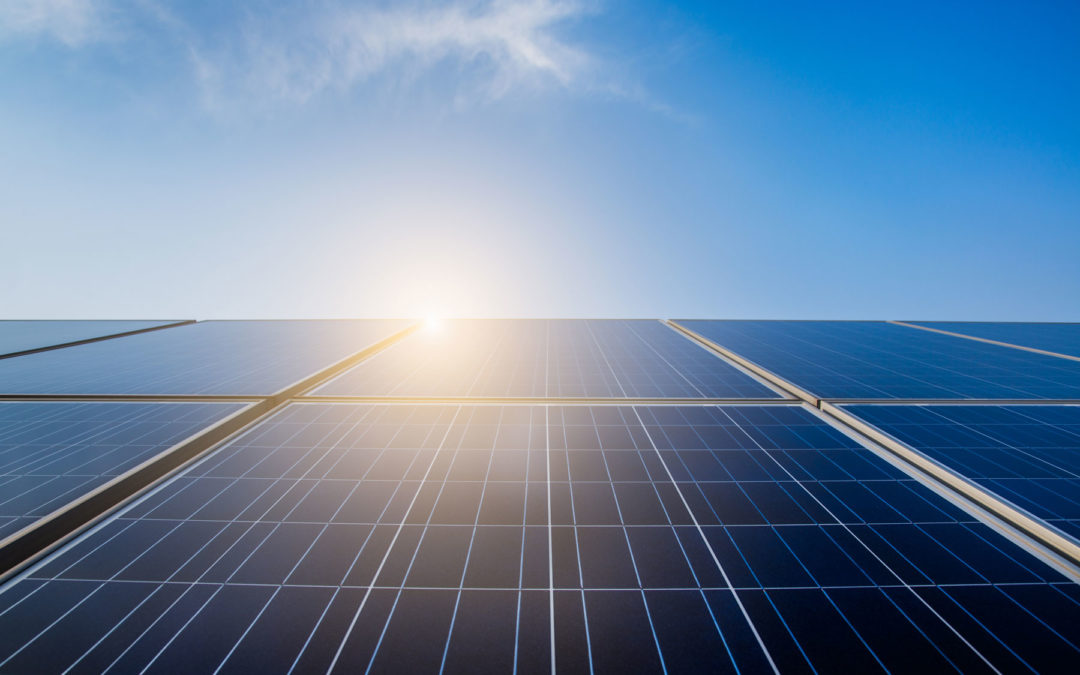
by Tyler Huebner | Dec 3, 2019 | RENEW Wisconsin
RENEW Wisconsin has partnered with Madison Community Foundation (MCF) to offer a charitable gift annuity.
What is a charitable gift annuity?
Like other annuities, a charitable gift annuity offers a regular stream of income on an initial investment until your death. However, charitable gift annuities are a form of planned giving and therefore differ from other annuities in several ways.
Here is how the charitable gift annuity works:
- You make a donation to a nonprofit organization, such as RENEW Wisconsin, and take a partial tax deduction.
- MCF, as the holder of the annuity funds, invests the funds on behalf of RENEW Wisconsin and pays you (the annuitant) a regular payment until your death. A portion of this income also may be tax exempt.
- After your death, the balance of the invested funds go to the nonprofit organization (RENEW Wisconsin, in this case).
The amount of your tax deduction depends on a number of factors, including your age at the time you establish the charitable gift annuity, the size of your donation, and whether the annuity is for a single person or a couple. You should consult with your tax advisor to determine the specific tax benefits for your situation.
Who can set up a charitable gift annuity?
The gift annuity is available for donors who are 60 and older. MCF requires an initial investment of $10,000, and offers an interest rate on the gift that ranges from 4.3% for a single 60-year-old to 9.3% for a couple who are both 95 and older. (There is no upper limit on investments.)
Whatever is left in the fund at the time of your death will be put into RENEW’s endowment fund with MCF. This fund supports Energy Analysis & Policy (EAP) graduate student interns at UW-Madison’s Nelson Institute who are working at RENEW. The endowment was created by an MCF grant and gifts from EAP alumni and RENEW members a few years ago.
As an example, a 71-year-old, single RENEW member recently established a gift annuity with MCF for RENEW. He made an initial investment of $10,526. Based on his age and the amount of his initial investment, his annuity earns an interest rate of 5.7%, or $600 a year, which is paid quarterly. He was eligible to take a tax deduction of $3,527, and $460 of the annual income is tax free.
The gift annuity is ideal for people who are older than 60, looking for a higher interest rate than offered by certificates of deposit (CDs) for their savings, and who want to support a nonprofit, even after death. The charitable gift annuity through MCF is designed to have a residual amount of at least 50% of the original gift for the charity. In 2017, the average amount left for charities from charitable gift annuities using the same rates (those recommended by the American Council on Gift Annuities) was 62% of the initial contribution.
For more information, contact Heather Allen at RENEW Wisconsin (608.255.4044 or heather@renewwisconsin.org) or David Koehler at MCF (608.232.1763 or dkoehler@madisongives.org).






